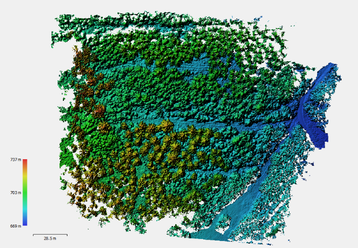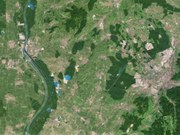Environmental Modelling and Data Sciences

We are living in an age of data: sensors, satellites and stations record environmental states around the world, in many systems.
Environmental Modelling and Data Science aims at equipping the students with a wide and relevant range of computer-based skills to address research and application challenges in environmental science. Ever-larger data sets from automatised data collections (remote sensing, omics) and large research and public data collections (weather stations, iNaturalist, ebird) require appropriate data science and modelling competences. As these methods are in constant flux, the profile Environmental Modelling and Data Science (EMDS) develops fundamental skills in statistics and programming and combines them with concrete studies and analyses.
Important facts about this major
Language: English
Teaching form: on-campus
Pace of study: fulltime
Study location: Freiburg
Start: only in winter term
Duration: 4 Semester
Application periode: march 1st - may 15th
ECTS: 120 ECTS (80ECTS modules, 10 ECTS Internship, 30ECTS Thesis)
Costs: 190€ semester fees, 1.500€ study fees (only non-EU students!)

- Focus
- Uses process models of environmental systems and statistical, data-driven approaches.
- Teaching in R and Python.
- Profile track is embedded in a Master programme of environmental topics and interests.
Program overview  pdf
pdf
Module details
1) Environmental Statistics
- introductory module beyond multiple regression
- builds on and extends statistical knowledge and its application
- standard machine-learning approaches in R or Python
- joint module with students from other profile tracks
2) Environmental monitoring, data analysis and visualisation
- automatised data handling
- data based setup and management
- data-wrangling and related visualisation
3) Earth System Modelling
- formulating processes as ODEs
- simulating (coupled) (partial) DEs using R/Python
- programming (modules of) a simple ecosystem model
4) Ecosystem Functioning
- Background knowledge on important processes in ecosystems
- overview of ecological approaches and systems
- link to other profile tracks, and to their students
5) Remote Sensing & Geoinformatics
- obtaining and processing remote sensing data
- using open satellite data to quantify environmental processes and states
- automatised big-data processing
6) Applied Land Surface Modelling
- linking ecosystem models to remote sensing
- parameterisation of land-surface models
- scenario analysis with land-surface models
7) Bioinformatics
- acquiring omics data from data bases and services
- analytical pipelines for omics data
- combining omics data to address environmental questions
8) Modelling Environmental Systems
- handling large models for environmental systems
- sensitivity analysis and model application
- examples from agriculture and forestry
9) Capstone Project
- practicing collaboration with applied environmental scientists
- joint project with forestry, hydrology or environmental science students
- reproducing and re-evaluating published (process or statistical) modelling studies
10) Advanced Statistics
- generalised mixed-effect models, analysis of temporally/spatially correlated data
- opt. advanced machine learning: validation techniques, error propagation
- opt. neural network architectures and their application
 Target Group
Target Group
Students with a BSc in environmental or natural science or engineering, who want to develop the skills required as a modeller and data scientist in the environmental sciences. An affinity and knowledge for statistics and data should be present. Basic knowledge of R or Python is assumed. (GLM: multiple regression for non-normal data, reading in data, plotting, simple data wrangling, simple statistical analyses, key concepts and practice with raster and vector data)
Career Opportunities
Environmental data, and their link to environmental process models, are at the heart of both academic and administrative work. Geological, hydrological, biological agencies have huge difficulties in keeping up with the development of new methods and require data scientists with understanding of typical environmental data and their context.
In academia, the number of automatised data collections is continuously increasing, making data handling and analysis a central skill. While the actual scientific question comes with knowledge of the field, methods required for addressing these questions build on the content of this profile track.
Application and Requierments
Requirements
- Degree with grade point average of at least 2.5
- English C1
- 50 ECTS in natural sciences and ecology
- 20 ECTS in statistics and geomatics
- Knowledge of a higher programming language
-> Basic knowledge of "R" is assumed!
Application periode: March 1st - May 15th
Application portal: HISinOne
further information: "Application"
Coordinator & Contact
Department of Biometry and Environmental System Analysis



